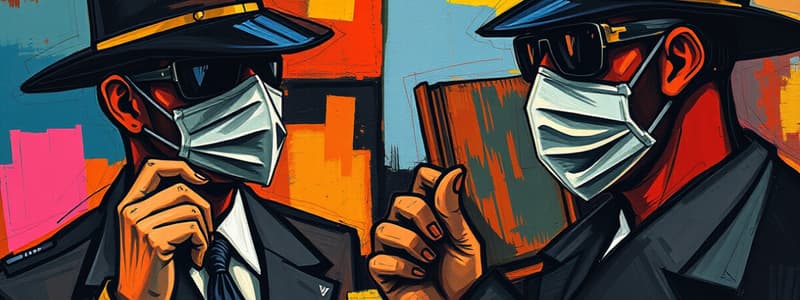Podcast
Questions and Answers
What was the average amount paid by each person in the United States to support the Criminal Justice System in 2013?
What was the average amount paid by each person in the United States to support the Criminal Justice System in 2013?
- $500
- $1000
- $800
- $670 (correct)
What comes immediately after a crime becomes known to the police in the Criminal Justice System?
What comes immediately after a crime becomes known to the police in the Criminal Justice System?
- Trial
- Sentencing
- Investigate and Apprehend (correct)
- Plea Bargain
What is the role of victim advocates in the Criminal Justice System?
What is the role of victim advocates in the Criminal Justice System?
- To prosecute offenders in court
- To investigate criminal activities
- To provide support and resources to crime victims (correct)
- To represent the rights of the accused
What occurs during the arraignment in the Criminal Justice System?
What occurs during the arraignment in the Criminal Justice System?
Why is legislation required in the context of personal liberties and the Criminal Justice System?
Why is legislation required in the context of personal liberties and the Criminal Justice System?
What is the primary goal of the criminal justice system?
What is the primary goal of the criminal justice system?
Which of the following is NOT a primary component of the criminal justice system?
Which of the following is NOT a primary component of the criminal justice system?
As of the end of 2016, how many adults were being supervised in the criminal justice system?
As of the end of 2016, how many adults were being supervised in the criminal justice system?
What demographic factors influence imprisonment rates according to the content provided?
What demographic factors influence imprisonment rates according to the content provided?
What was the total cost of the criminal justice system in 2013?
What was the total cost of the criminal justice system in 2013?
Flashcards are hidden until you start studying
Study Notes
Criminal Justice System Overview
- The Criminal Justice System (CJS) comprises institutions, policies, and practices aimed at social control and crime deterrence through sanctions and rehabilitation.
- Three primary components of CJS: Law Enforcement, Courts, and Corrections.
Components of the Criminal Justice System
- Law Enforcement: Investigates crimes and apprehends alleged offenders.
- Courts: Interpret and enforce the law.
- Corrections: Includes incarceration, community supervision, parole, and probation.
Size and Cost of the Criminal Justice System
- CJS is extensive and costly, with over 6.6 million adults supervised in jails, prisons, or on parole by 2016.
- In 2013, the CJS employed 2.4 million individuals at a cost of 212billion,equatingto212 billion, equating to 212billion,equatingto670 per person in the U.S.
Demographics in the Criminal Justice System
- Higher imprisonment rates for men and people of color.
- Personal characteristics of offenders and victims can influence the severity of punishment.
Process of the Criminal Justice System
- Crime detection initiates police investigation, leading to offender apprehension.
- Prosecutors decide on charges, which may lead to plea bargains or trials.
- Defendants can plead guilty, not guilty, or nolo contendere, with trials concluding in conviction or acquittal.
Victims in the Criminal Justice System
- Classic CJS process often neglects victims, who may require medical and psychological support.
- Victim advocates help guide victims to necessary resources.
Crime Classification
- Mala in se: Inherently wrong behaviors.
- Mala prohibita: Behaviors deemed illegal by law.
- Categories can evolve over time, allowing for decriminalization.
Evolution of Crime Definitions
- Justifiable Homicide: Includes self-defense and state-sanctioned executions, reflecting changing societal views.
- Adultery: Once a criminal act, now largely decriminalized.
- Driving Under the Influence: Increased legal penalties due to advocacy and public awareness.
- Rape: Legal definitions have broadened significantly to encompass various forms of sexual violence.
Perspectives on the Criminal Justice System
- Crime Control: Advocates for harsh punishment to deter crime; research suggests this may not be effective.
- Due Process: Emphasizes fair and equal treatment within the CJS, rooted in U.S. Constitution principles.
- Restorative Justice: Focuses on repairing harm and ensuring offenders "pay" for their crimes.
- Nonintervention: Advocates minimal CJS involvement to avoid negative stigmas and effects on individuals.
Models of Justice
- Consensus Model: Assumes agreement on what constitutes harmful behaviors, focusing on collective justice.
- Conflict Model: Suggests power disparities influence definitions of crime, with the powerful shaping laws.
Media Framing of Crime
- Faulty Criminal Justice Frame: Suggests crime occurs when criminals believe they won't be caught.
- Blocked Opportunities Frame: Attributes crime to a lack of legitimate opportunities.
- Other frames include social breakdown, racism in the justice system, and the impact of violent media.
Distinction Between Criminal Justice and Criminology
- Criminal justice refers to the system involving law enforcement, courts, and corrections.
- Criminology focuses on studying the nature, extent, causes of criminal behavior, and victimization.
Studying That Suits You
Use AI to generate personalized quizzes and flashcards to suit your learning preferences.




